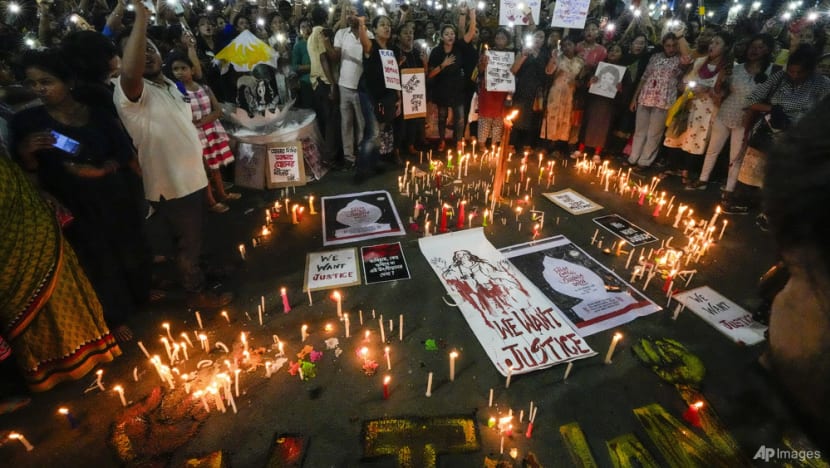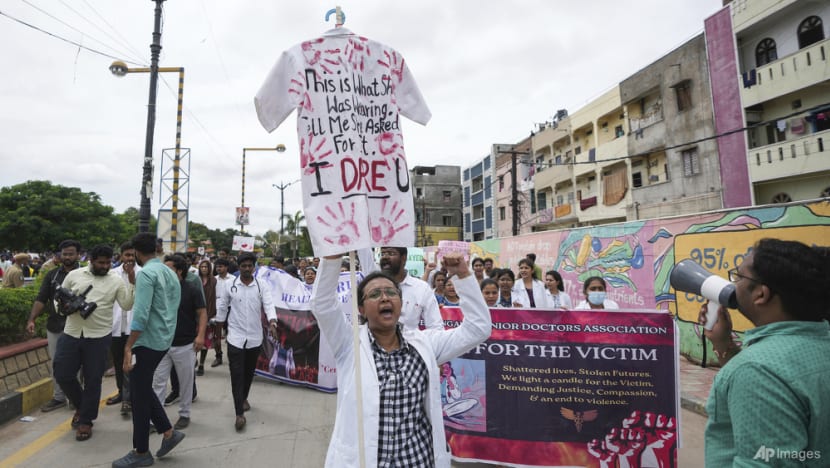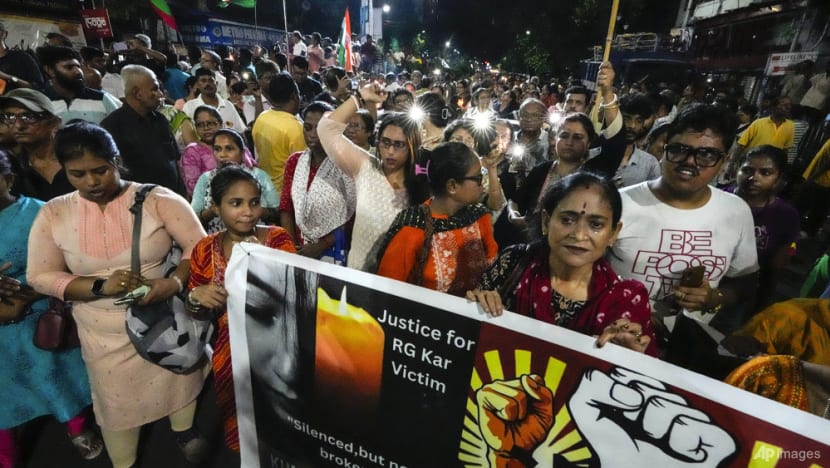Brutal rape and murder of doctor in India renews concerns of sexual violence against women
About 85 cases of sexual assault were reported in India every day in 2022, with many more said to go unreported.

People hold lit mobile phones while surrounding candle lights and posters on road protesting against the rape and murder of a resident doctor at a government hospital in early August, in Kolkata, India, on Sep 4, 2024. (Photo: AP/Bikas Das)

This audio is generated by an AI tool.
KOLKATA: Amrita Pratiyar and Suchismita Majumdar now refuse to go anywhere alone in the hospital they have worked at for the past two years.
The recent brutal rape and murder of a trainee doctor at Kolkata's state-run RG Kar Medical College and Hospital has the pair on edge, forcing them to look over their shoulders at every turn.
Their colleague, Moumita Debnath, was on duty on Aug 9 when the attack happened. Her body was found in a seminar room on campus.
“Whoever is beside me or around me, I doubt everyone. I have to be more careful. I have to be more conscious … I can’t trust anyone,” Suchismita, a senior nurse, told CNA.
Amrita, a student, added: “We’re not safe in our workplace, which we used to think was our second home and the second safest place (to be).”
The incident in the capital of India’s West Bengal state triggered nationwide demonstrations and led to thousands of doctors across the country suspending non-emergency medical services.

These actions compelled the country’s Supreme Court to intervene and order the formation of a national task force to carry out broad-ranging security reforms in hospitals.
A scheduled Supreme Court hearing is taking place on Thursday (Sep 5), a day after thousands of Kolkata residents participated in a symbolic “lights out” protest to express support for the victim’s family.
Her parents reportedly joined the doctors at RG Kar Medical College and Hospital.
The case has also once again cast a spotlight on the pervasiveness of sexual violence in the world’s most populous nation, which was rocked in 2012 by the gruesome gang rape and murder of a 23-year-old female physiotherapy intern in a moving bus in south Delhi.
31,000 SEXUAL ASSAULTS REPORTED IN 2022
According to latest government data, 31,000 cases of sexual assault were reported in India in 2022.
That comes up to about 85 cases per day, with many more said to go unreported.
The government has said it is reviewing ways to boost safety in hospitals. After doctors across India demanded more security at government-run hospitals, the government agreed to increase the number of security personnel at healthcare centres by 25 per cent.
Female doctors and nurses told CNA that sexual harassment in some form is common in hospitals.
While they did not want to speak on the record, fearing rebuke from senior colleagues and government officials, their claims are supported by private sector data showing that the number of sexual harassment cases reported or being probed in India’s largest companies has doubled in the past year.
SOCIETAL POWER DYNAMICS AT FAULT, SAY WOMEN
Many women in India say sexual violence is more than a law-and-order issue. They blame it on society’s power dynamics that skew heavily in men’s favour and a culture that tolerates sexism.
“There are instances of men bullying women, taunting them - a lot of things, like small acts of aggression - that’s how it starts. And we have seen now how it can end,” said Mala, a Delhi resident.
Another Delhi resident, Vaishnavi Sharma, believes family background plays a crucial role in building a man’s character.
“It decides whether they make women feel safe around themselves, whether they respect women or not,” she added.
Activists said the most ignored are poor women from the country’s lower caste called Dalits - people once described as "untouchable." But things change when the victim is an urban, well-educated, so-called “upper caste” professional.
“There is that selective rage, and the problem is that unless we change that larger patriarchal, caste-ist mindset, this is not going to go away,” said Neetika Vishwanath, director of sentencing at Project 39A – a litigation and research centre that represents death row inmates in India.
In the Kolkata case, officials were also under significant pressure to act because India's medical community is unionised and promptly responded to calls for a strike.

DEATH PENALTY DID NOT LEAD TO DESIRED EFFECT
When the 2012 gang rape and murder took place, tens of thousands of people took to the streets in India, forcing the government to strengthen anti-rape laws a year later.
But legal experts said introducing the death penalty for the gang rape of a minor, as well as potential life sentences for sexual assault of adults, have not had the desired effect.
Vishwanath pointed out that the certainty of punishment, not the severity of it, is what deters would-be offenders.
“That becomes very important in the case of sexual violence in India, because be it rape of adult women or rape of children, you see that rates of conviction remain low,” she said.
She argued that this could be due to shoddy investigations, poor handling of evidence, delays in court procedures, and the tendency to not believe women victims.
Furthermore, Vishwanath said tougher sentences - such as a minimum jail term of 10 years - might actually be counterproductive, as judges could be more willing to acquit accused persons if they feel the potential sentence is grossly disproportionate to the crime.
“The attention has to be on social reforms, governance measures, institutional reforms, and actually focusing on the needs of the survivor,” she added.

















